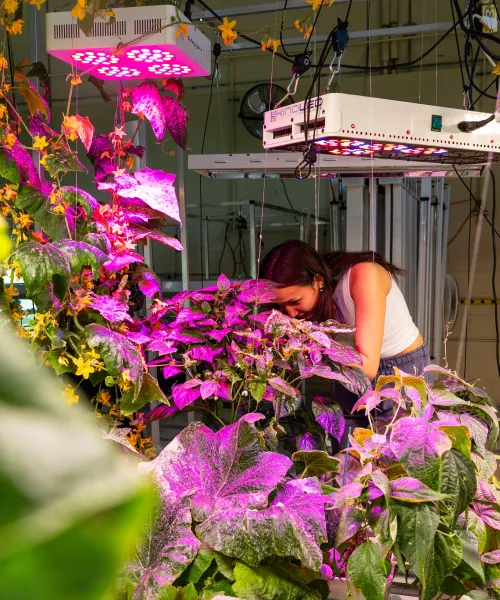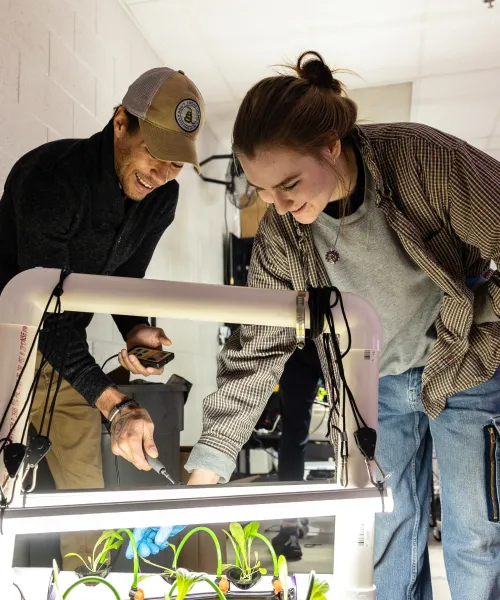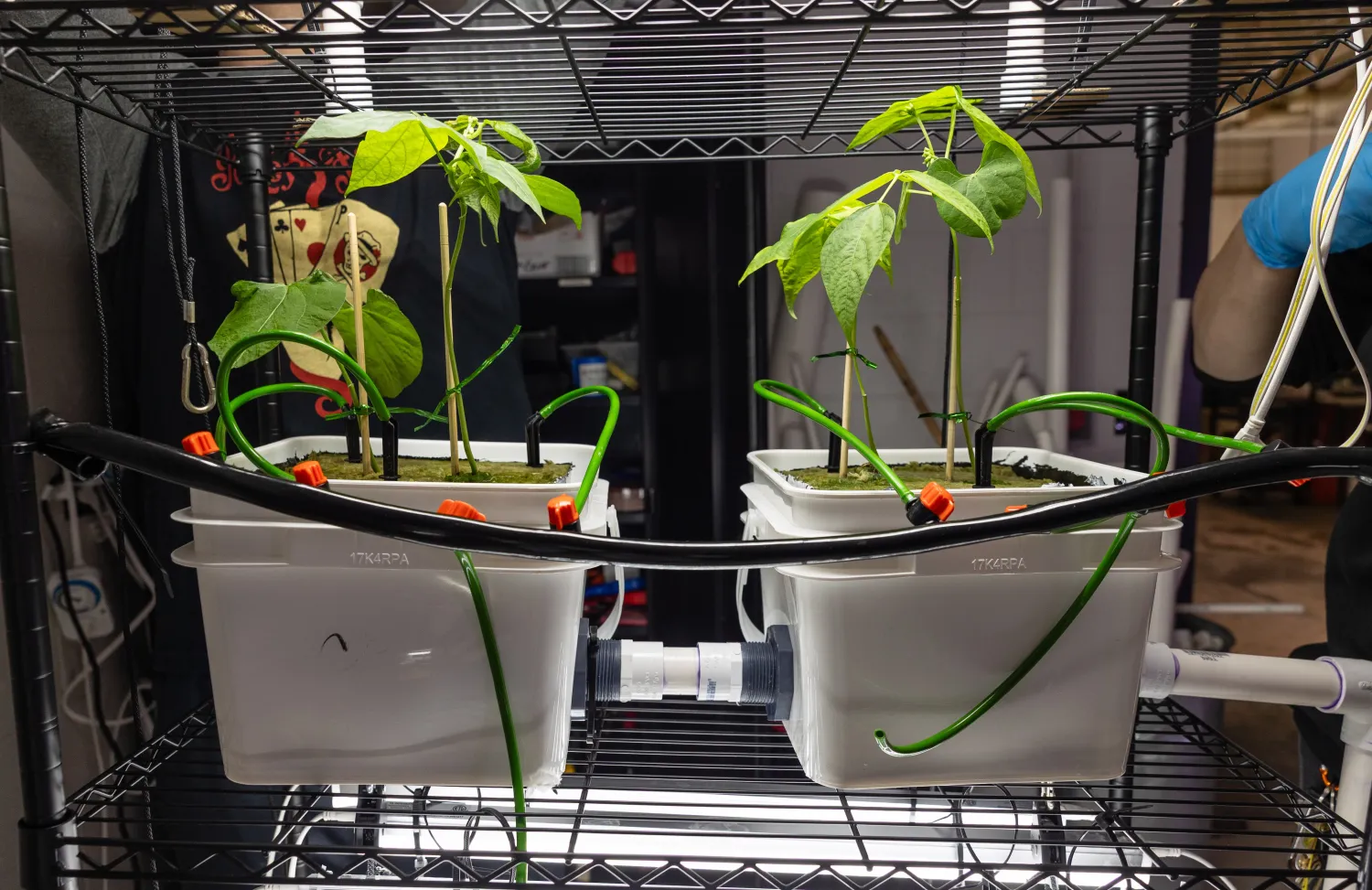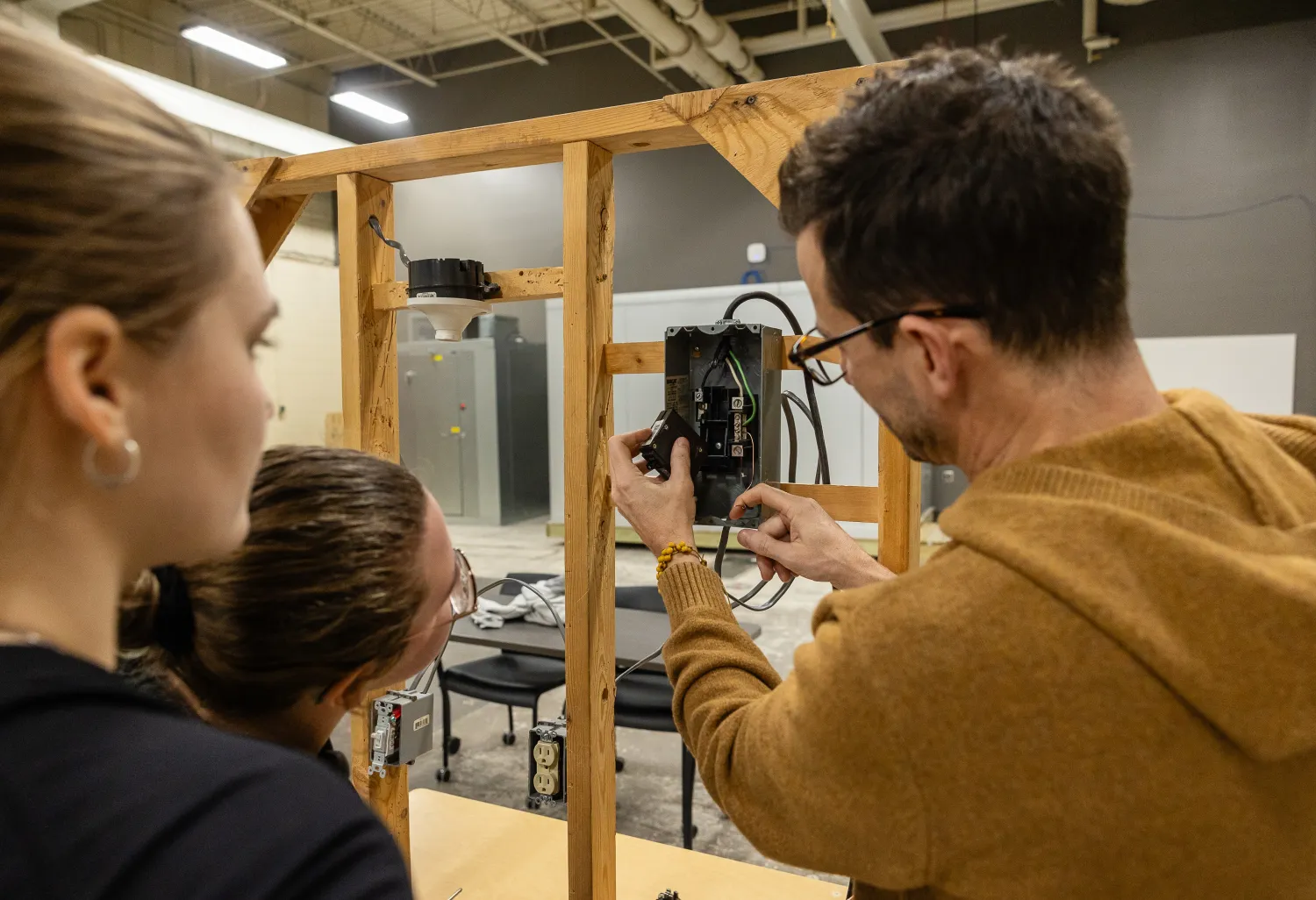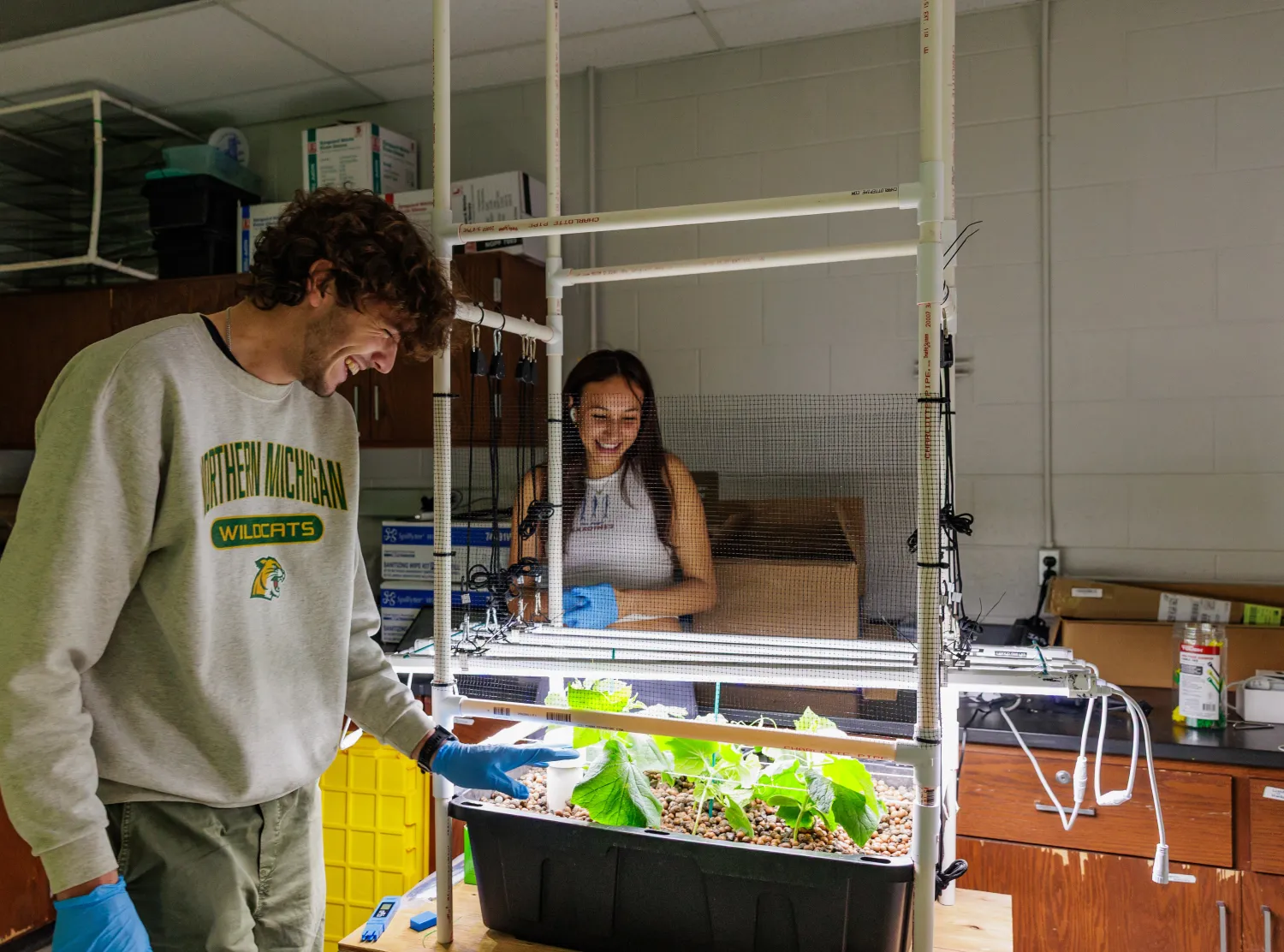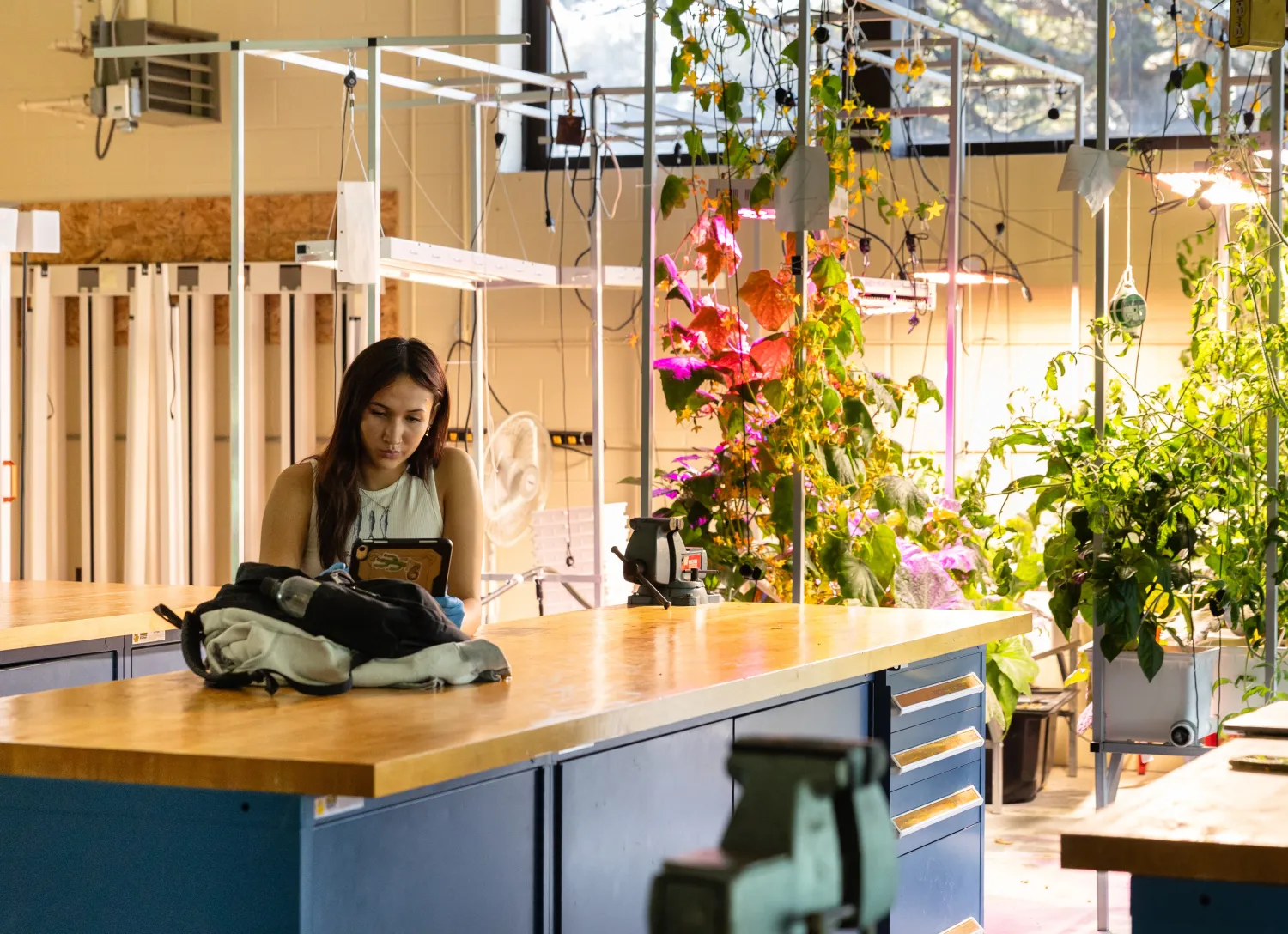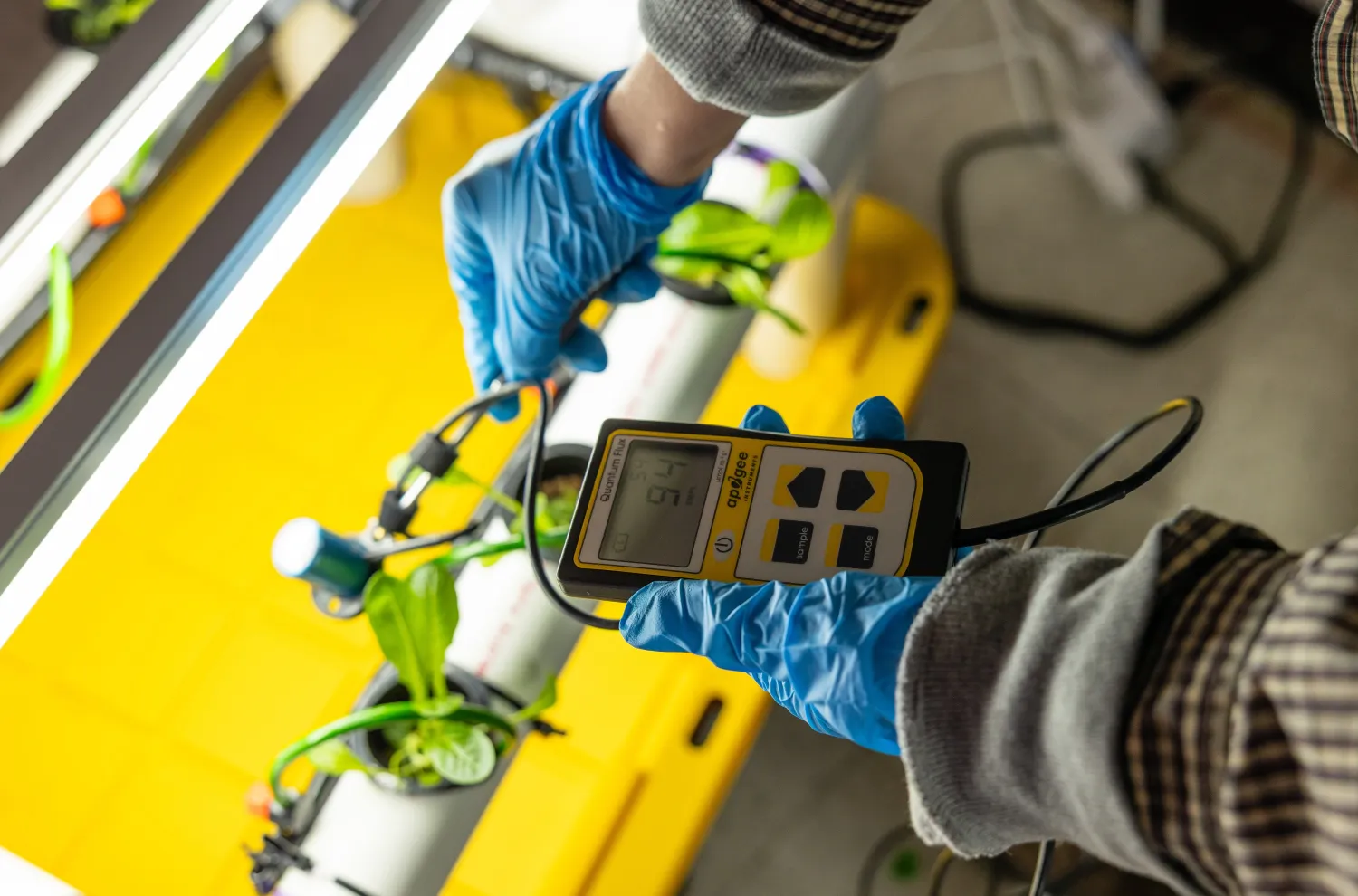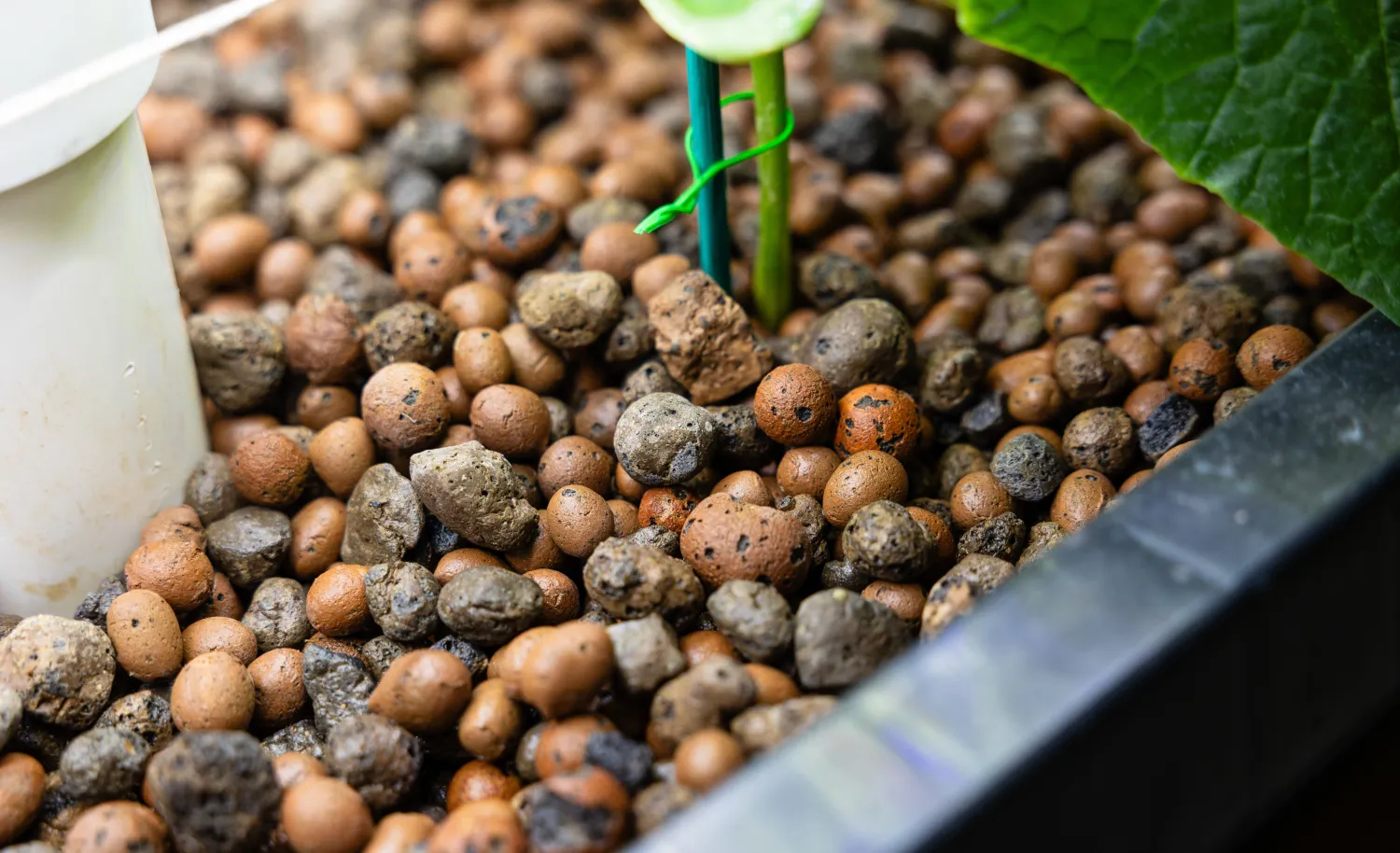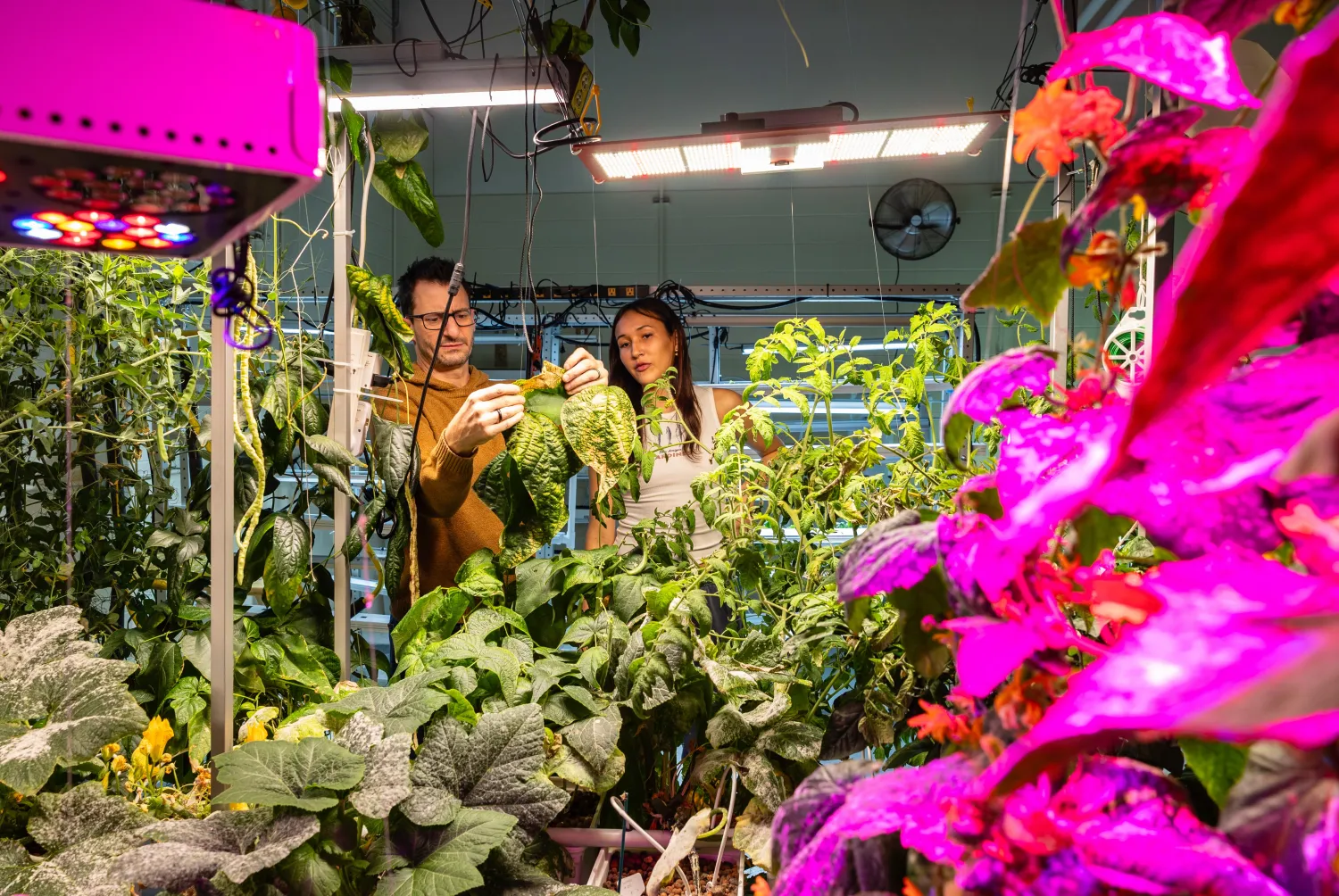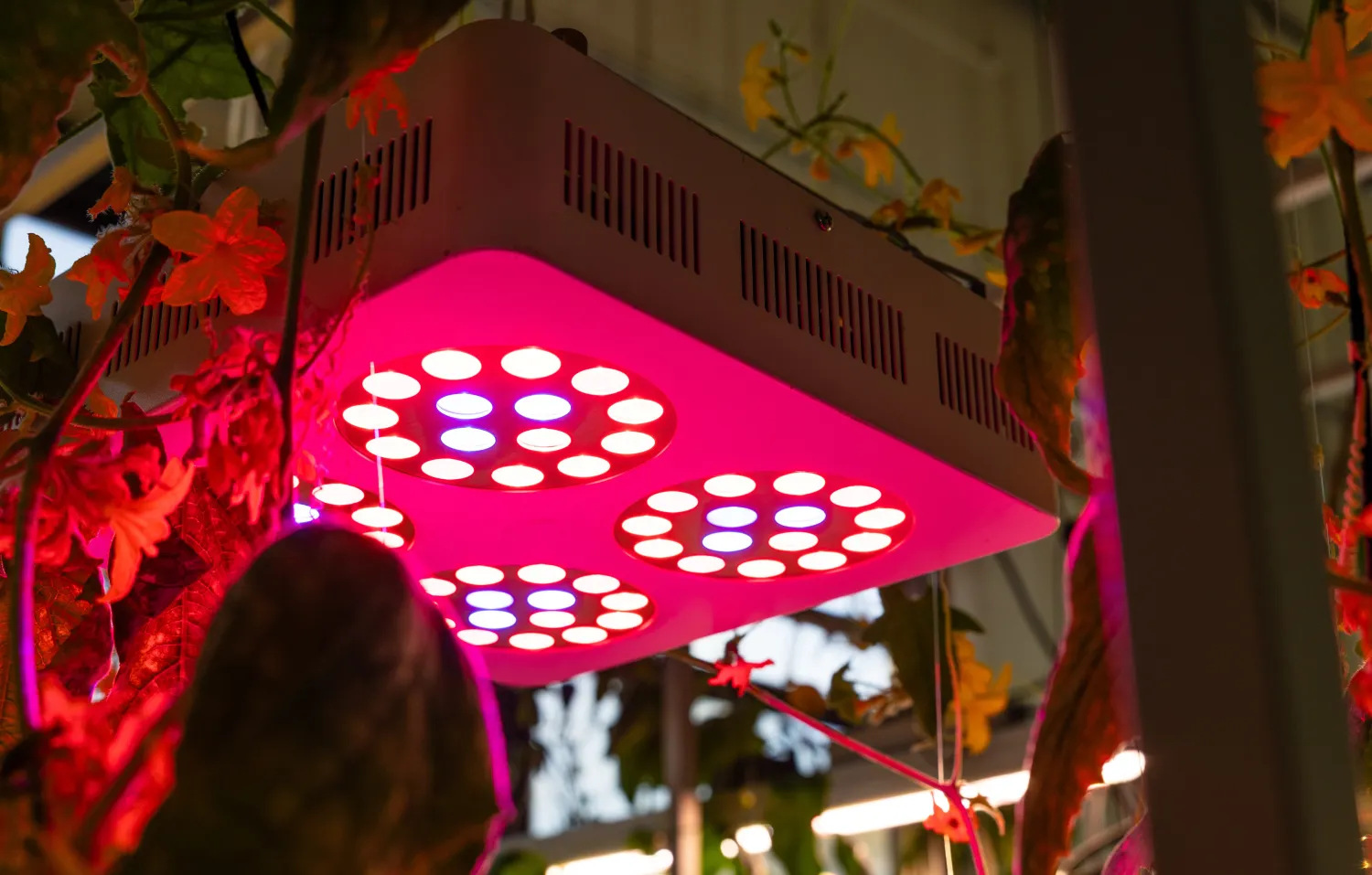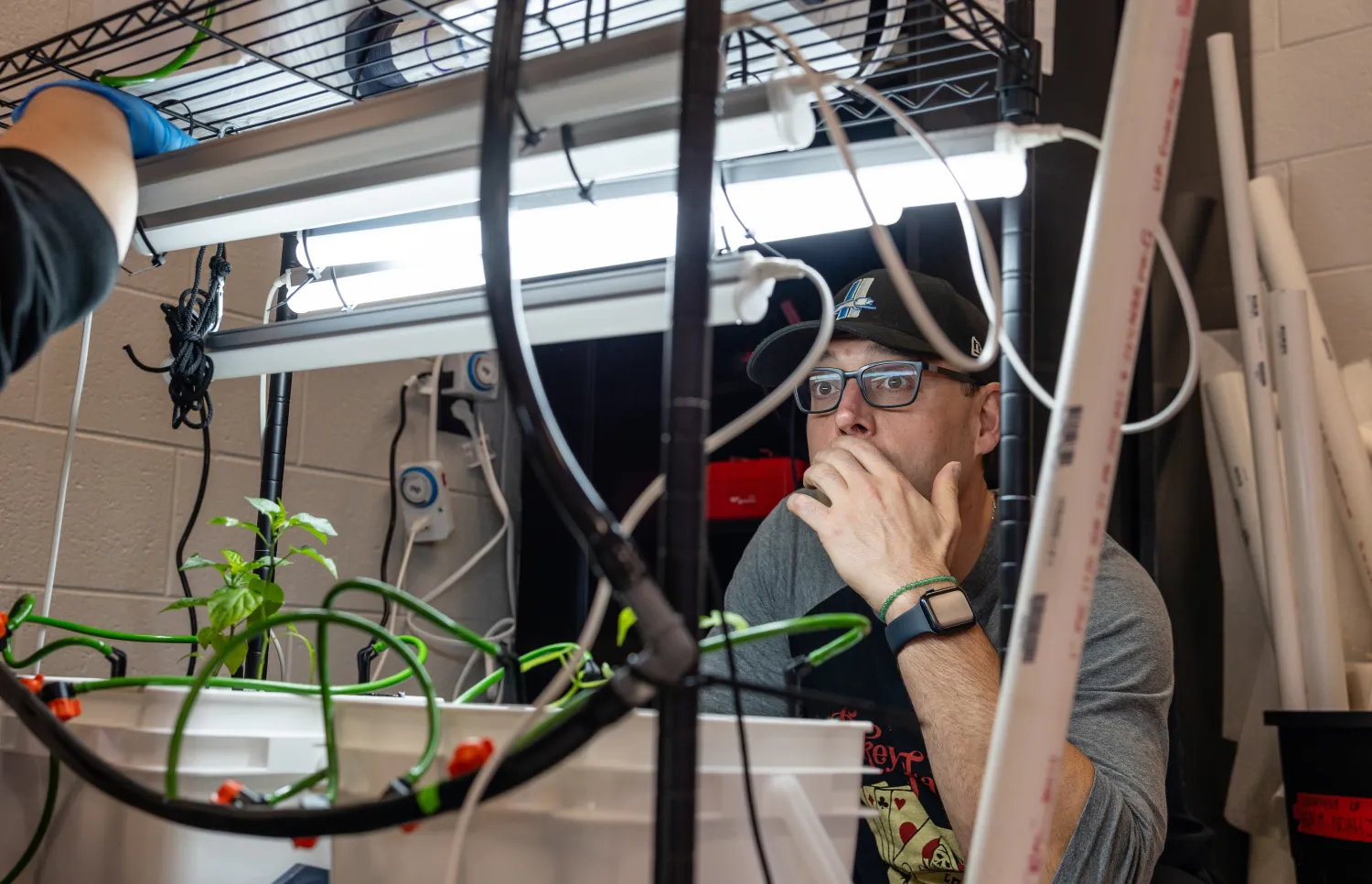What It's All About
The Controlled Environment Agriculture program at NMU provides a comprehensive and hands-on learning experience for students interested in this rapidly expanding field. The program offers a unique blend of theoretical knowledge and practical skills, equipping students with the tools needed to excel in a field focused on minimizing negative impact and maximizing yield. Students have access to state-of-the-art vertical farming systems and hydroponic set-ups where they gain valuable experience in crop cultivation, plant nutrition, pest management, environmental control systems, and automation technologies.
The interdisciplinary curriculum also emphasizes sustainability and resource management, highlighting the importance of minimizing water usage, energy consumption, and chemical inputs. With dedicated faculty members, industry partnerships, and a strong focus on experiential learning, NMU's Controlled Environment Agriculture program prepares students for successful careers in the thriving and innovative field of indoor farming.

Programs
Controlled Environment Agriculture
Bachelor of Science
In the four-year (120 credits) Controlled Environment Agriculture (CEA) program, students will learn to integrate indoor agriculture techniques into commercial crop production, optimize crop yields through plant chemistry and physiology, evaluate mechanical and electrical systems in different CEA facilities, analyze food system networks and their societal impacts, establish standard procedures for fresh produce production, and apply essential business practices to CEA operations.
Program Outline
Indoor Agriculture
Associate of Applied Science
With a focus on sustainability and addressing climate and population concerns, the two-year (60 credits) Indoor Agriculture (IA) program emphasizes efficient and sustainable farming practices, including the adaptation of indoor farming models to northern climates. Students learn various growing and climate control systems, cutting-edge design and construction, and facility management. They will also explore plant biology, business practices, and the integration of diverse perspectives to tackle global food insecurity and develop sustainable, pesticide-free food systems.
Program Outline
Indoor Agriculture
Minor
Studies are based on a foundation of plant cultivation techniques, greenhouse management, hydroponics, and sustainable agricultural practices to learn valuable skills that can be applied to a variety of industries, from food production and urban farming to research and development.
Program Outline
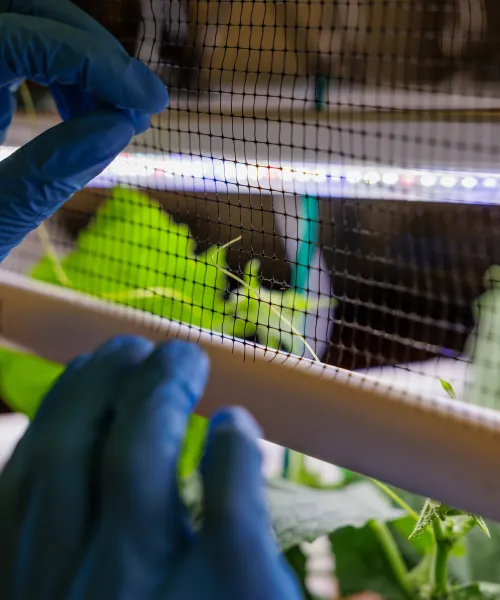
FREQUENTLY ASKED QUESTIONS
As an emerging field, a career in controlled environment agriculture can take many forms. Professionals in this field may wish to learn indoor growing skills to complement traditional farming for sustainable growth, work to eliminate food deserts by increasing access to fresh produce in urban environments, and to address climate concerns. Employment as a grower or production manager, horticulturist, plant scientist, and data analyst are all options for those with a CEA degree.
Graduates may also apply the skills they've learned about various systems to work as a system design engineer, planning and building physical structures including lighting, irrigation, and climate control systems. Students may complete an HVAC/R certificate and seek employment as an environmental control specialist, or work in a variety of roles in the cannabis industry.
A good deal of this program is trouble-shooting, problem-solving, and discovering what works and what doesn't. Together we will explore what materials, designs, and mechanics are required to yield the best outcomes and will continue adding to our skillset to see better results each time.
No one is expected to come into this program with any experience. We draw inspiration from a variety of places and recognize that everyone has strengths in different departments. Whether you come to us with interests in chemistry, or construction, or farming, or sustainability, we place a big emphasis on teamwork and growth.
Sometimes our crop may fail, but everyone has the ability to have a green thumb.
Yes! In our bachelors degree program, students design and construct a working system. Students budget, plan, and collect materials, then have dedicated lab time to build. And no experience using tools required! We go over proper use and safety, and professors oversee open lab hours when students can come in to work on their systems.
We've had systems made of PVC pipe, wood, found materials, and even welded! Allow your creativity and innovation to shine with this project.
Timothy H. Adams, CPA; Principal, Tax Department Cannabis Niche LeaderTim joined Maner Costerisan in 1999 after they merged with his former firm, Henderson, Miller & Robbins, P.C. He currently serves as a principal at Maner Costerisan, as a member of the firm’s board of directors and is the leader of the firm’s cannabis industry niche. Tim was formerly head of the firm’s tax department. | |
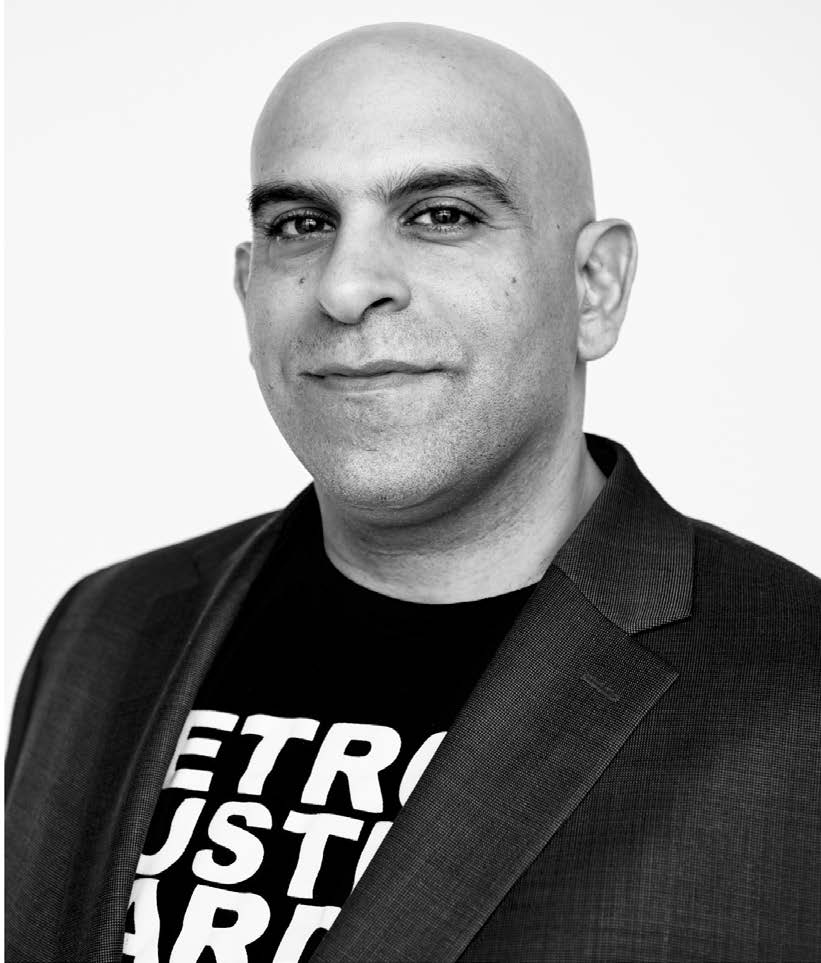 | Micheal EliasMichael is the co-founder and CEO of Common Citizen (CC). Common Citizen is the largest vertically integrated cannabis company in the state of Michigan with up to 1.2 million square feet of cultivation, two processing labs and up to nine retail locations all across the state of Michigan. With over 45 licenses, CC is the largest prequalified license holder in the state. Michael spent 21 years re-engineering healthcare operations, leading change and establishing improvement systems with the purpose of transforming culture and sustaining change. Michael was the CEO and founder of Elias Group Corp, an international consulting practice specializing in large healthcare transformations world-wide. He has traveled all over the world taking over underperforming health systems and strategically transforming there clinical and non-clinical business practices. He was a major catalyst of transformational change at North York General Hospital (NYGH) in Toronto, Canada. As the Chief Transformation Officer of the health system he develop, deployed and sustain NYGH’s award winning improvement system. NYGH recently ranked by Newsweek Magazine as the second best hospital in Canada and top 100 in the world in terms of clinical outcomes and efficiency.
|
 | Loganne Glendening, Assistant Professor, CHEAs a professor of NMU’s Hospitality Management program since 2014, she has a true understanding for the needed improvement of global agriculture production. As an adopted “Yooper”, Loganne believes Marquette is an outstanding location for this one of a kind program based on climate and industry diversity. She indicates she is excited to support the knowledge and skills NMU’s Indoor Agriculture program will bring NMU students, community and local industry. She will contribute to this committee by providing multiple perspectives and resources on industry topics such as sanitation, sustainability, licensing, product diversity, and distribution. As a Certified Hospitality Educator (AHLEI) and recipient of the 2019 NMU Excellence in Teaching Award, she looks forward to contributing to the programs hands-on, exploration-based learning model by supporting current and new faculty in their development of curriculum. Additionally, she values the opportunity to work as part of a diverse team of individuals who will provide me new opportunities for growth and understanding. |
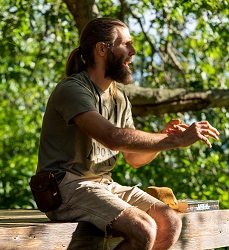 | Ryan IacovacciRyan is co-founder and owner of Myconaut. Myconaut works to accelerate fungal and microbiological based solutions for regenerative food as medicine production, climate resiliency and environmental toxicity. Ryan received his B.A. in Religious Studies and B.A. in International Relations from the University of South Florida. For the next 15 years, he gained experience in agriculture ranging from small/large scale permaculture to local food distribution, including time at Sweetwater Organic Farm (Tampa), Blue Cross Blue Shield of Florida, YMCA of Tampa, Local Roots and Swallowtail Farm (Gainesville). It was during his time at Swallowtail Farm that he was instrumental in bringing renowned author and local food activist Joel Salatin to Swallowtail’s Annual Spring Festival. In 2016, Ryan and wife moved to Marquette where they currently run their homestead, Moon Mnt. Ryan hopes that between his two businesses, Myconaut and Moon Mnt, they will continue to build bridges of understanding around food and community. |
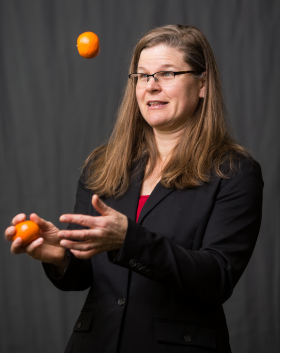 | Dr. JoubertDr. Joubert received her BS in Kinesiology from Cal State in 1994 and MS in Exercise Science from NMU in 1998. While working in the fitness industry as a strength and conditioning specialist, personal trainer, and swim coach she realized her passion for proper nutrition. She earned her PhD in Nutrition and Food Management from Oregon State University in 2007. Prior to her hire at NMU in 2013, she worked as a registered dietitian and a corporate wellness director. She is currently an associate professor of nutrition at NMU and a board certified sports dietitian and her research interests span from cardiovascular wellness, fitness, and eating behavior. |
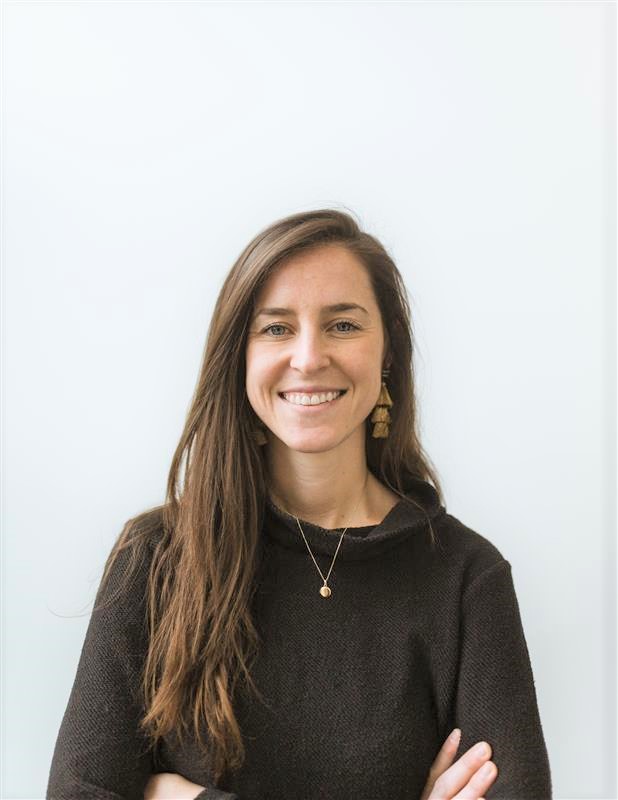 | Ms. Molly Kreykes, Senior Project Manager at Green Peak InnovationsMolly received her B.S. from the University of Wisconsin-Madison in Agronomy with a minor in Environmental Studies before completing her M.S. in Crop and Soil Sciences at Michigan State University. She studied forage crop production for her master’s thesis, with her research centered around yield, quality and soil dynamics of birdsfoot trefoil – tall fescue pasture mixtures. With a passion for innovative and sustainable agriculture, Molly then moved to San Francisco to work for an AgTech startup, Plenty, where she was first introduced to Indoor Agriculture. She started as a Senior Grower, overseeing the vertical hydroponic leafy green grow operation, before transitioning to the operations Production Manager. Wanting to live closer to her family while still staying in Indoor Ag, Molly moved back to her home state of Michigan in 2019 to work for a vertically integrated licensed cannabis company, Green Peak Innovations (GPI). At GPI, Molly started on the Research & Development team learning how to manufacture high quality cannabis products in a precisely controlled environment. She now serves as the Senior Project Manager, overseeing numerous key projects for GPI. |
 | Douglas MainsDouglas Mains is a partner with Honigman LLP, where he specializes in government relations and regulatory law, with a particular emphasis on providing clients with advice regarding public policy, legislation, and administrative and election law issues. Mr. Mains previously served as a Senior Policy Advisor and Deputy Legal Counsel to two Speakers of the Michigan House of Representatives, and regularly advises members of the Michigan Legislature and legislative staffers on policy-related issues. Having helped draft the Medical Marihuana Facilities Licensing Act and the Michigan Regulation and Taxation of Marihuana Act, Mr. Mains is also recognized as being at the forefront of Michigan’s evolving cannabis and hemp laws, and is frequently asked to speak on legislative and legal developments in those industries. |
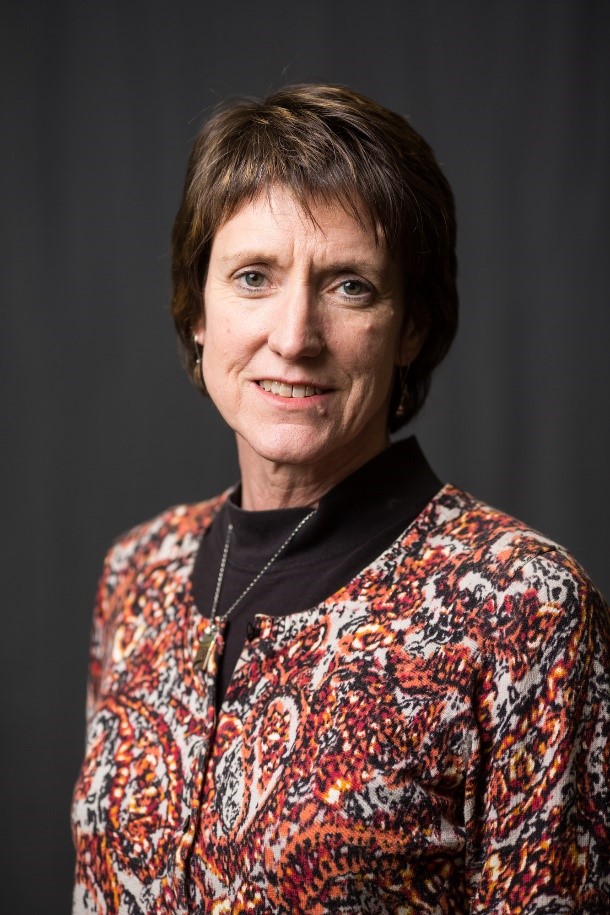 | Lesley PutmanLesley Putman received her B.S. in Chemistry from Wheaton College in 1982 and her Ph.D. in Biochemistry from Purdue University in 1987. After doing post-doctoral research at Michigan Technological University, she began her first teaching position at Earlham College in Indiana. Desiring to return to the North, she accepted a position at NMU as an Assistant professor in the Department of Chemistry in 1993 and now holds the rank of Professor. She teaches Biochemistry and was part of the team that started the Medicinal Plant Chemistry Program in Fall of 2017. She is a plant biochemist and does research in phytoremediation, using plants to clean up contaminants in the soil. |
 |
Dr. Kim Smith KolasaDr. Kim Smith Kolasa is a Partnership Development Director for Fork Farms. She co-founded Northern Michigan University's Indoor Agriculture program and served as the core faculty member and program coordinator. She has an Ed.D. in Educational Leadership from Central Michigan University, with her research focusing on plant biology education and women's experiences in the newly emerging STEM field of indoor agriculture. Kim as taught biology and science education and served as a STEM education consultant for the Glenn T. Seaborg Math and Science Center. She also owned a specialty cut flower farm and flower shop.
|
 | Chris StanderfordChris Standerford is the Director of the Central Upper Peninsula MiSTEM Network and Director of the Seaborg Mathematics and Science Center at Northern Michigan University. He has 23 years’ experience in education, including K-12, outside of school time, and higher education. Current professional interests include interdisciplinary learning, place- and problem-based learning, equity, career exploration, and workforce development. |
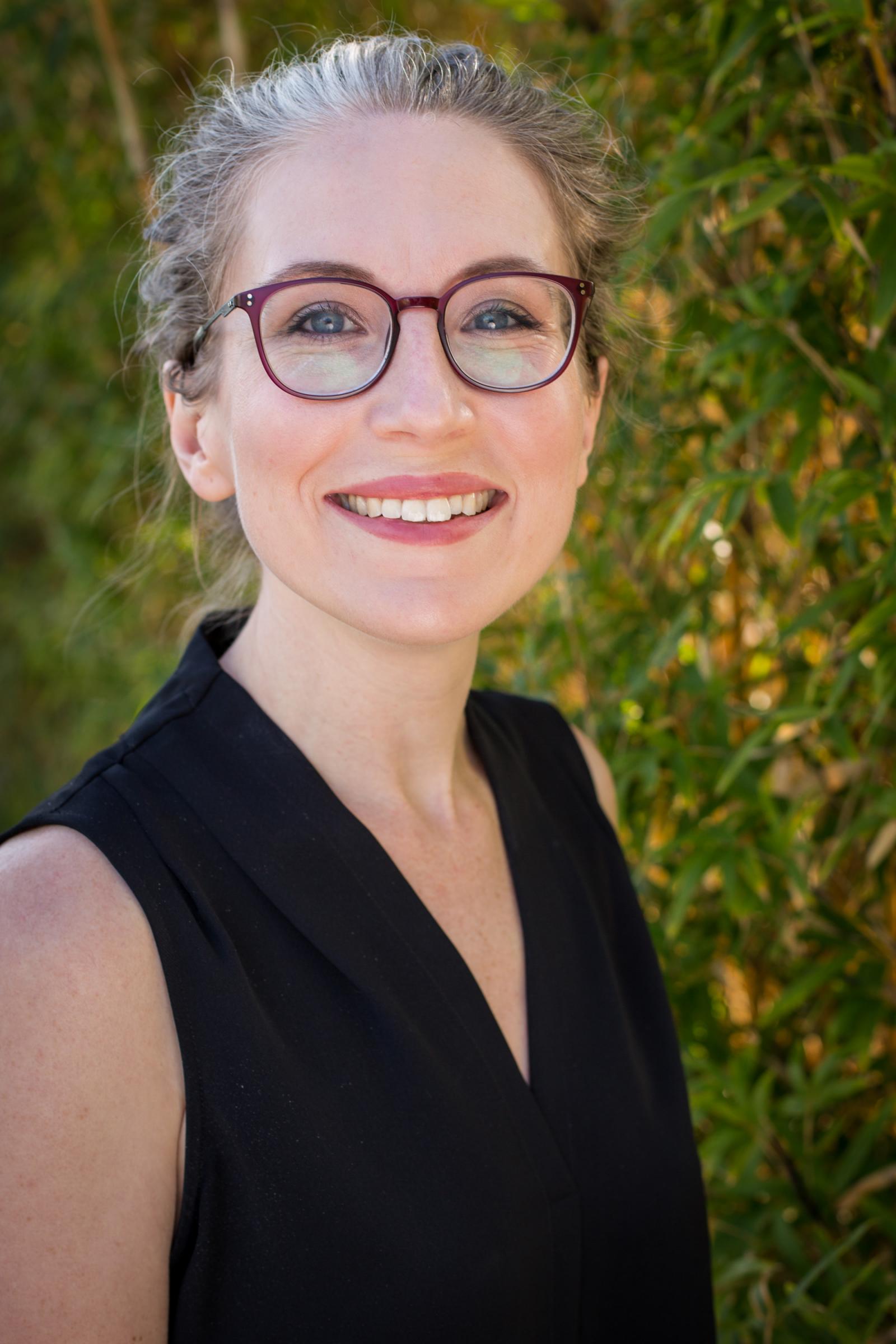 | Molly StanekMolly began her career in agriculture as the Associate Director of Horticulture for Sweet Water Organics, a revolutionary aquaponic farm in an old abandoned industrial building in Milwaukee, Wisconsin. As Associate Director, Molly led the the design and expansion of Sweet Water to seven aquaponic greenhouses producing leafy greens and vine crops on a 6.5 acre site. She left to co-found Imagine Aquaponics, a firm that designed commercial-scale, sustainable waste-to-resource food production systems and provided internationally attended trainings and consultation to both educational and nonprofit entities as well as interested individuals of high net worth. During this time, Molly fed her love for good food by enjoying a role as a founding member of three farm-to-table restaurants. After nearly seven years as an AgTech entrepreneur, Molly joined Plenty, a vertical farming in the Bay Area where she served as General Manager of the company's farm, delivering three iterations of system designs, SQF food safety certification, and ultimately the first ever product launch to consumers. Her career next led her to Sensei where she founded the future farms division for Sensei Ag, a wellness driven agriculture program founded by Larry Ellison and Dr. David Agus to nourish the world's population through data driven, sustainably rooted, technology enabled food production systems. Over the past two years, Molly has overseen the buildout of Sense & 39;s 5-acre Tesla solar powered hydroponic greenhouse farm on the island of Lānai, tripled the size of the division across both technology and operations teams, and worked to further plant science research into development of nutrient rich produce. When Molly is not creating innovative food systems to increase the quality, sustainability, or accessibility of food, you are likely to find her crafting fine porcelain ceramics or behind the camera capturing her latest outdoor adventures. A proud Wisconsinite, Molly pursued her BFA in Ceramics as well as a secondary program in Environmental Biology at the University of Wisconsin-Whitewater. |
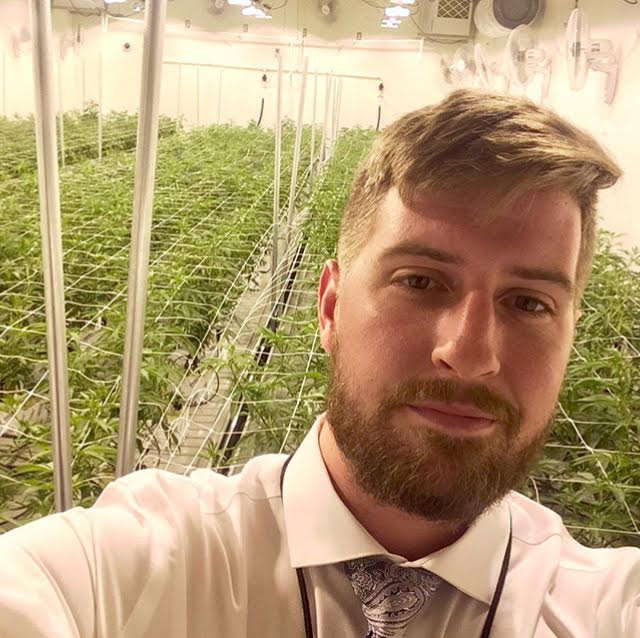 | Jared Toogood
|
Program Links
Contact Information
The Technology and Occupational Sciences office is at Northern Michigan University's Jacobetti Complex, Room 105.
Phone: 906-227-2190
Email: tos@nmu.edu
Controlled Environment Agriculture Faculty & Staff
Kari Farkas-Lasich | Assistant Professor
Phone: 906-227-2191
Email: kfarkas@nmu.edu
Lehren Olk-Szost | Assistant Professor
Phone: 906-227-1068
Email: lolkszos@nmu.edu
Brandon Bucklin | CEA Lab Manager and Instructor
Phone: 906-227-2141
Email: bbucklin@nmu.edu

